 Petzlover
Petzlover Pomsky is originated from United States but Scottish Terrier is originated from United Kingdom. Pomsky may grow 14 cm / 6 inches higher than Scottish Terrier. Both Pomsky and Scottish Terrier are having almost same weight. Both Pomsky and Scottish Terrier has almost same life span. Both Pomsky and Scottish Terrier has almost same litter size. Both Pomsky and Scottish Terrier requires Moderate Maintenance.
Pomsky is originated from United States but Scottish Terrier is originated from United Kingdom. Pomsky may grow 14 cm / 6 inches higher than Scottish Terrier. Both Pomsky and Scottish Terrier are having almost same weight. Both Pomsky and Scottish Terrier has almost same life span. Both Pomsky and Scottish Terrier has almost same litter size. Both Pomsky and Scottish Terrier requires Moderate Maintenance.
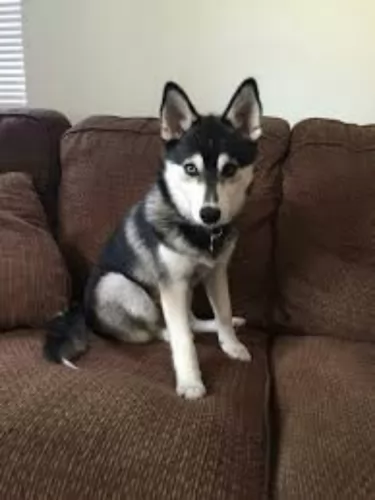 Pomskies are such cute little wolf-like dogs, you just wish they’d been around much sooner.
Pomskies are such cute little wolf-like dogs, you just wish they’d been around much sooner.
They’re a fairly new addition to the breed of designer dogs, believed to have originated in 2009, in the United States. Today they are a well known, and sought after designer dog breed.
They are a cross between the Pomeranian and a Siberian Husky. As a designer dog breeds, the Pomeranian Husky isn’t recognized by the American Kennel Club. There is a Pomsky Club of America and they are wanting to get the breed registered.
 The Scottish Terrier is also known as the Aberdeen Terrier but people who love and know him refer to him fondly as the Scottie.
The Scottish Terrier is also known as the Aberdeen Terrier but people who love and know him refer to him fondly as the Scottie.
These little dogs were originally bred to hunt vermin on farms and their actual origin is ancient. It is believed that the first descriptions of these dogs date way back to 1436 with there being 2 varieties - a rough-haired Scotch Terrier and a smooth-haired English Terrier.
In 1881 the Scottish Terrier Club of England was founded with the Scottish Terrier Club of Scotland being founded in 1888. Scotties were introduced to America in the early 1890s.
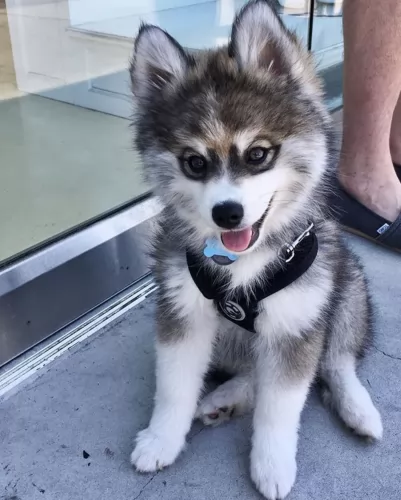 Just like most hybrid breeds, the Pomsky can have mixed looks – taking more after one or the other dog.
Just like most hybrid breeds, the Pomsky can have mixed looks – taking more after one or the other dog.
They can stand between 25 to 40cm in height and weigh between 9 to 14kg. The dog looks like a small Husky, but even so, in one litter, there can be some variety between the puppies in terms of looks and temperament.
The dogs have a soft double coat that keeps the dog comfortable in icy temperatures. Coat colors vary and the coats can be grey and white, a reddish brown or even solid white.
You’ll find your Pomsky to be amusing and entertaining as he is quite clownish.He fits quite easily into life in the city or in the countryside.
Wherever you are, part of being a responsible dog owner includes taking him for walks and seeing that he gets enough exercise. He is a vocal dog, which might not be good in the city if you live near to your neighbors as he can howl and whine quite a bit.
Training and socialization will be important for him, particularly as he tends to be nervous around strangers. Socialization makes him obedient, well balanced an well behaved.
They are playful, loving dogs and intelligent too so you won’t have trouble getting him trained and socialized.
 The Scottish Terrier is a small dog, fairly robustly built but with short legs. He has a wiry, weather-resistant coat and a soft undercoat. The coat is essentially black but there are other colors too such as a wheaten shade, grey-black and brindle too.
The Scottish Terrier is a small dog, fairly robustly built but with short legs. He has a wiry, weather-resistant coat and a soft undercoat. The coat is essentially black but there are other colors too such as a wheaten shade, grey-black and brindle too.
The ears are erect, the eyes small and bright. The tail isn’t docked but is of medium length and is nearly always held up, without curling over the back.
Height at withers for both males and females should be roughly 23 to 26cm and weight in the region of 8 – 10 kg.
The Scottie is a an independent, robust breed. He is playful as a puppy, but as he matures he becomes more dignified and dour. He is stubborn, but being a terrier he is alert and makes a good watchdog. For a small dog he has a powerful bark.
Brave, loving and loyal, he can fit into life in the city or the countryside so long has he has his human family close by. He doesn’t take kindly to strangers and he he slightly aggressive with other dogs he doesn’t know. He makes a great playmate for children but he certainly doesn’t like being prodded, sat on and poked by small children.
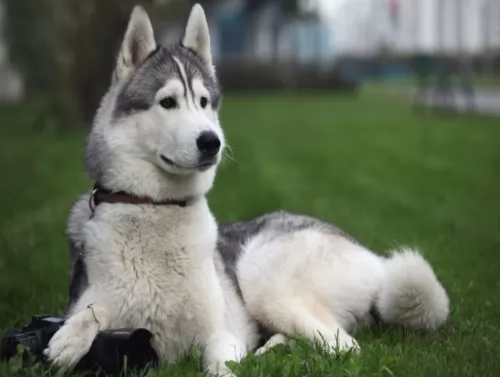 A Pomsky is such a great pet to have. They’re intelligent dogs and respond well to training and socialization.
A Pomsky is such a great pet to have. They’re intelligent dogs and respond well to training and socialization.
They’re playful, confident and full of life and want nothing more than to be an active member of the family. He will need quite a bit of exercise and will love playing with the children in the home.
Provide him with love and care, and you can count him in as a faithful, loving pet and companion.
 The Scottie is strong willed and independent, and training and socialization is important if you don’t want your Scottie believing he has the final say.
The Scottie is strong willed and independent, and training and socialization is important if you don’t want your Scottie believing he has the final say.
These dogs are stubborn and dominant and will need a strong, firm but kind owner. They’re aggressive with other dogs, but get on well with their human family.
When you bring one of these distinctive looking dogs into your home, he’ll be a loving, loyal friend.
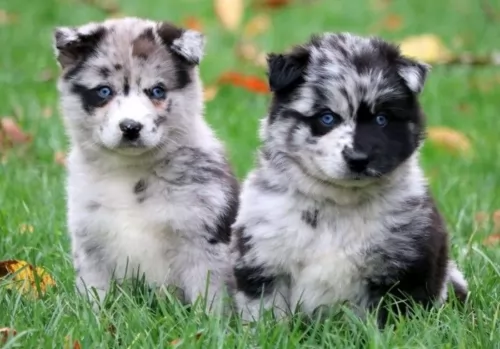 Your Husky and Pomeranian mix promises to be resilient in the face of illness if you feed him well and exercise him. Still, no dog is immune from the many common health issues there are that plague dogs.
Your Husky and Pomeranian mix promises to be resilient in the face of illness if you feed him well and exercise him. Still, no dog is immune from the many common health issues there are that plague dogs.
As a responsible dog owner, as soon as your pet is showing signs of being sick and in distress, you need to get him to the vet. Some common dog illnesses include bloat, cancer, skin allergies and hip dysplasia.
Bloat, also known as Gastric Dilatation and Volvulus:
This can be deadly for dogs, and when you see your dog’s stomach swollen and hard and he is restless and drooling, vet attention is required immediately.
The stomach is twisted and filled with gas that can’t escape. Pressure within the stomach puts pressure on other body organs and this can result in blood flow to the heart being stopped.
There are a number of theories as to why bloat occurs, but it is better to give your pet a couple of smaller meals a day instead of one large one which he gobbles up too quickly.
Its tempting to give your dog a piece of chocolate when he looks so pleadingly at you, but chocolate as well as other human foods can be toxic for your dog.
Chocolate has ingredients which are safe for human consumption but which can lead to a host of medical complications for your dog. Your dog may vomit, have rapid breathing, an increased heart rate and even seizures – it’s just not worth taking the chance.
 Your Scottie is looked upon as being a generally healthy dog breed, but as with any other healthy dogs, he can succumb to some of the conditions and diseases that dogs get -
Your Scottie is looked upon as being a generally healthy dog breed, but as with any other healthy dogs, he can succumb to some of the conditions and diseases that dogs get -
This is an inherited blood disorder where the blood doesn’t clot properly. The dog will bleed excessively after an injury. Fortunately, while there isn’t a cure, dogs can lead normal lives.
Scottish Terriers are more prone to developing cancer than other dogs. Bladder cancer, lymphosarcoma and malignant melanoma are just some of the cancers they can get. Some cancers are treatable and there is a good success rate in dogs receiving chemotherapy.
When you brush your Scottie, look out for new, unusual lumps that could be indicative of cancer.
Scotty Cramp isn’t serious but uncomfortable for your pet. When your dog becomes worked up, you’ll see him arching his spine and he walks around for a few minutes with a stiff unnatural gait.
Obesity is regarded as a serious disease as it puts strain on the dogs joints and also creates back pain and digestive disorders.
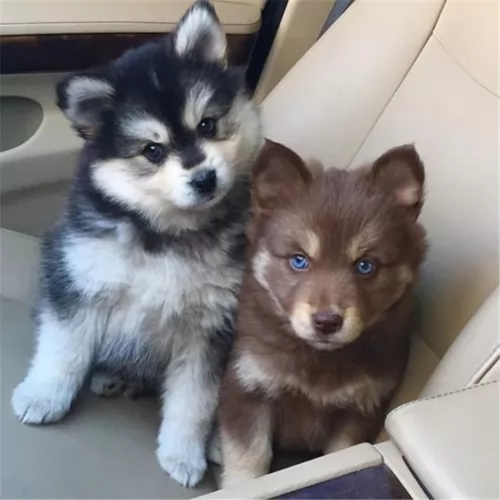 The thick coat sheds quite a bit so it will need to be brushed at least twice a week to keep it vibrant and shiny.
The thick coat sheds quite a bit so it will need to be brushed at least twice a week to keep it vibrant and shiny.
Nails will need to be trimmed regularly if they don’t wear down themselves. You will also need to check your dogs teeth when you brush him. A bad tooth can cause ill health that can damage the heart and kidney.
Your Pomsky is an energetic dog that requires a lot of exercise. While he will love a walk every day, they want more than that – loving to play ball- and frisbee games with all that energy.
Pomsky owners can’t be couch potatoes as this energetic dog will become bored, frustrated and destructive, and then an irresponsible owner blames the dog.
With so much energy, your Pomsky is going to require high quality food that ensures his energy levels remain high. Commercially manufactured dog foods can be wonderfully convenient, and the best ones can be excellent for your pet, with the right balance of vitamins and minerals.
High quality dry kibble can get a bit boring so add in some home-made food to the dry kibble to make it more interesting. Dogs thrive on simplicity, so boiled chicken, sweet potatoes, brown rice or pasta, carrots and spinach will be 100% sufficient for him. This can be chopped up into his dry kibble occasionally as a welcome treat.
Also, your pet will thrive on a bit of raw meat added in from time to time. Make sure he is never without a constant supply of fresh, cool water.
 Scotties were once bred as working dogs, and they will certainly require daily exercise and stimulation. He will love a walk but you can’t expect him to run with you as he has short legs.
Scotties were once bred as working dogs, and they will certainly require daily exercise and stimulation. He will love a walk but you can’t expect him to run with you as he has short legs.
The Scottie sheds, so he will need to be brushed at least twice weekly. He will require quite a bit of grooming in terms of having the coat professionally trimmed and clipped.
His eyes and ears will need to be checked as well as his teeth. He can’t tell you if he has terrible toothache and while brushing him, check the teeth. Trim his nails too.
It is always recommended that you feed dogs according to size, age and activity levels. Dogs are individuals and they don’t all need the same food.
The quality of the dog food you provide makes a huge difference on your dog’s health. It always pays to go with the better quality kibble available to dogs. Your Scottish Terrier will be depending on your for quality kibble with the right blend of vitamins and minerals.
Dogs thrive on simplicity and consistency and you want to provide him with some home-made food too that gels well with his digestive system. A little bit of raw meat occasionally can also do him the world of good.
Make sure he always has cool, fresh water to drink.